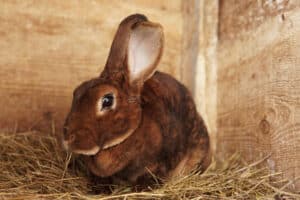Lionheads are tiny rabbits with short ears, compact bodies, and small heads. They’re known for being sweet, happy-go-lucky buns with lion-like manes.
They make excellent pets for dedicated owners who can provide them with a lot of space, time, and affection.
Lionheads require constant access to fresh hay, daily vegetables, and daily cleaning. They shouldn’t be kept in a cage, but instead allowed to free roam either a room or the entire home. Their long coats should be brushed at least once weekly.
Caring for a rabbit can be time-consuming and expensive, especially when you factor in their veterinary care.
In this article, we’ll discuss everything it takes to care for a Lionhead rabbit, from their diet to housing and more!
Introduction: Lionhead Rabbits as Adorable and Unique Pets
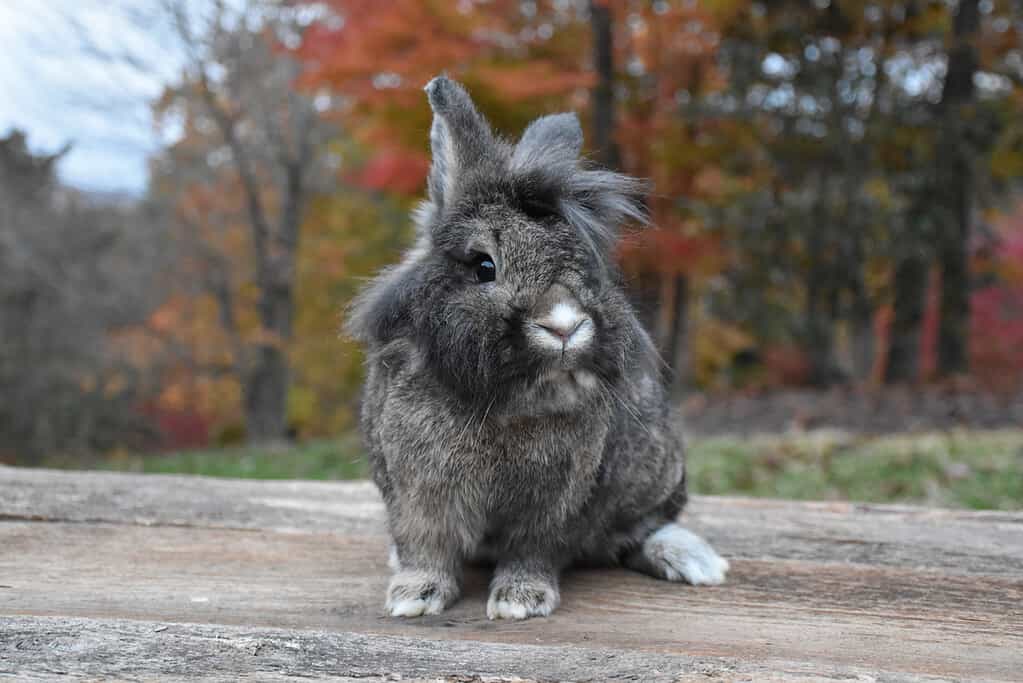
Lionhead rabbits are joyful and affectionate pets.
©iStock.com/JudyN
Lionhead rabbits are named for their manes, which make them look like tiny lions. They weigh less than four pounds and are incredibly fluffy!
There are two types of Lionhead rabbits: single and double-maned. Single-maned Lionheads grow out of their manes as they age, and adults have only wisps of fur. Double-maned rabbits keep their fluffy manes throughout their lives and may have longer hair on other areas of the body such as the back legs.
These buns are known for their playful dispositions and docile natures. They’re more likely to enjoy cuddles than other breeds and will love to play with chew toys and race through tunnels.
While cute, Lionhead rabbits are a huge responsibility as well! You should always adopt rabbits in pairs or groups. They cannot be kept in small, pet store cages, but instead thrive when allowed to roam in a bunny-proofed room or home. Rabbits are messy, and you’ll spend a lot of your time cleaning up after them.
Though rabbits are often seen as children’s pets, they aren’t a good match for young children and should never be used as a “starter pet” before adopting another animal. Remember that rabbits are very frail, sensitive animals. They don’t do well with sudden movements, loud noises, or rough handling.
Kids should always be supervised around rabbits, and an adult must be ready to step in if the child loses interest in the bunny or neglects their care. Lionheads can also have high vet bills and need regular check-ups like any other pet.
Temperament and Personality: Exploring the Playful and Affectionate Nature of Lionhead Rabbits
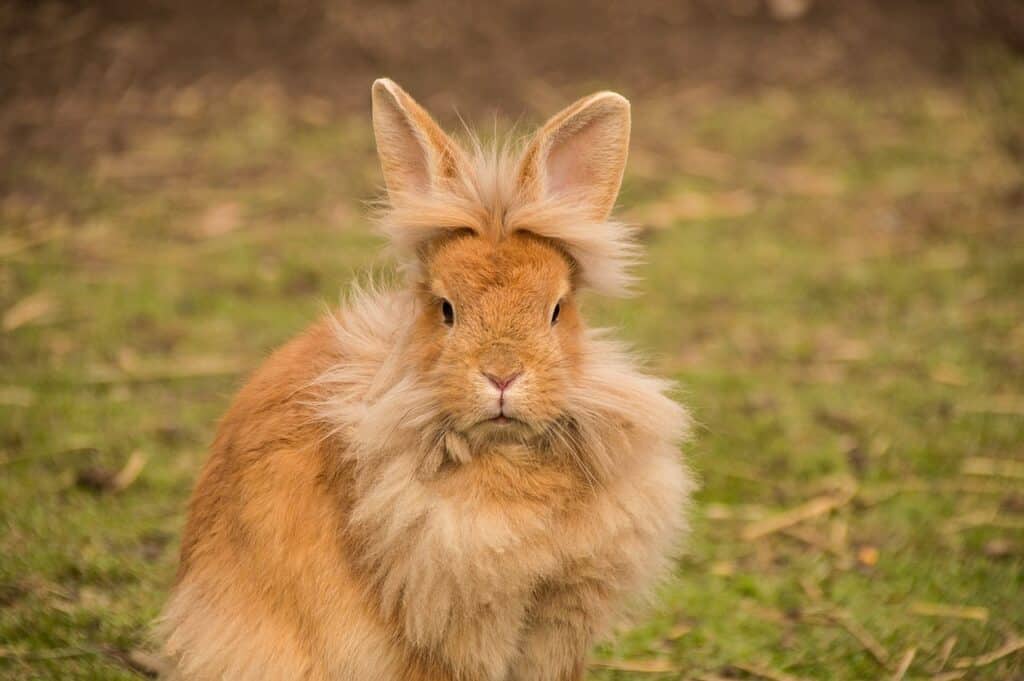
All rabbits need time to get used to a new home and can be skittish when you first meet.
Lionheads are known for being sweet and even-tempered. They’re docile, and some enjoy cuddling with their favorite humans.
However, getting to this point takes time and daily interaction. You should never force your rabbit to cuddle–instead, try sitting with them and allowing them to come to you.
These buns are also very playful. When given space to roam, Lionheads will zoom around and launch themselves into the air excitedly (also known as a binky). They’re sure to make you laugh with their antics.
A Lionhead’s personality shines through best when they’re given proper care, which includes the right nutrition, space to roam, and attention from you. We’ll discuss more about how to bond with and care for your Lionhead below.
Bonding with Your Lionhead Rabbit
Bonding with a rabbit isn’t the same as bonding with a cat or dog, which are the pets many of us are used to. The reason for their differences is that rabbits are prey animals.
This means they can be much more fearful of humans because we’re a predator species. Rabbits don’t like us towering above them, picking them up from above, or making quick, unpredictable movements.
The best way to bond with your Lionhead rabbit is to get low to the ground, either sitting or lying down on the floor. Offer your rabbit small pieces of fruits or vegetables to encourage them to interact with you.
Speak in quiet tones, and don’t try to touch them at first. Wait until they’re coming close voluntarily before offering head scratches.
Over time, your rabbit will get used to sharing a space with you. They will no longer fear normal human behaviors like walking around or talking to others in the household. This does take time, especially if living with a family is a new experience for your Lionhead.
Diet and Nutrition: Understanding the Proper Feeding Requirements for a Healthy Diet
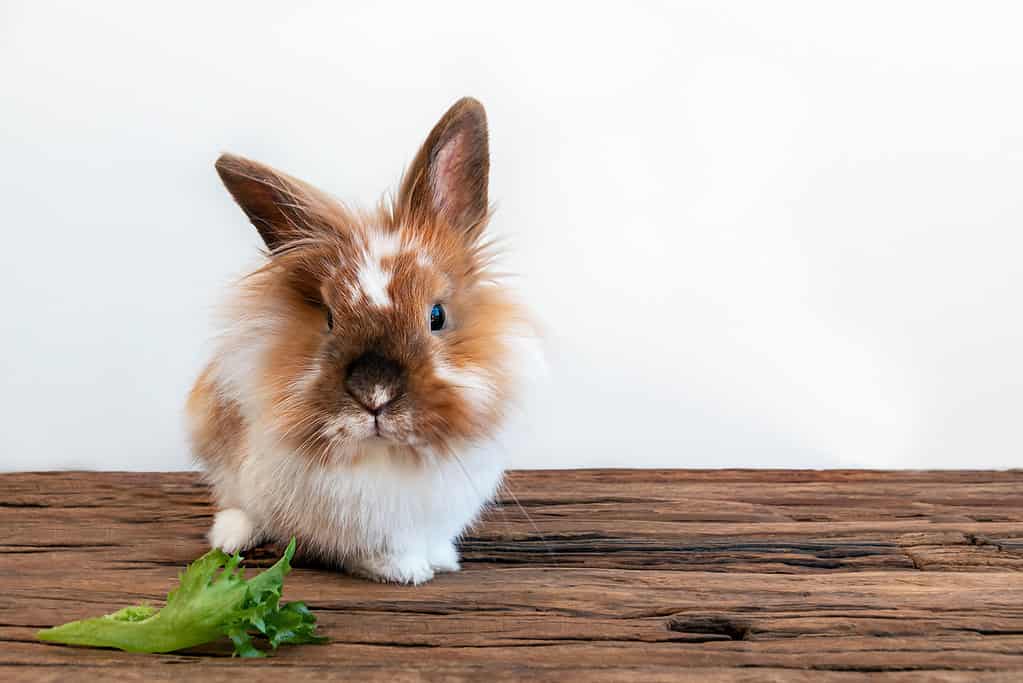
Lionheads need constant access to hay in addition to daily fresh vegetables.
©Olga Novik/iStock via Getty Images
Hay
Rabbits must have constant access to hay and fresh water. Grass hay such as timothy hay or orchard grass should make up around 85% of their overall diet.
Lionhead rabbits have fast metabolisms that must stay in motion, meaning they should never be without food. As grazing animals, bunnies will spend most of their day munching on hay or other foods.
Vegetables and Pellets
The other 15% of your Lionhead rabbit’s diet consists of daily fresh vegetables and rabbit pellets. Dark, leafy greens are best for rabbits, and they should get a variety of vegetables to ensure their nutritional needs are met.
A small amount of daily rabbit pellets can also help to ensure they’re getting the right balance of nutrients. Avoid pellets with bright colors and seeds, and instead opt for plain pellets. While these look boring to the human eye, they contain everything your rabbit needs without harmful additives.
Some people opt out of feeding their rabbits pellets completely, but this can be dangerous unless you’re sure that your bun is getting the right mix of nutrients from their vegetables. I wouldn’t recommend it for a beginner!
Fruit and Other Treats
Fruit can be served to your Lionhead rabbit in very small servings as a treat, but shouldn’t be a dietary staple! Fruits and forage mixes are the healthiest treats for your rabbit.
Avoid store-bought treats unless looking carefully into each ingredient, as many items sold in pet stores are unsafe. This includes anything containing seeds, yogurt, and other dairy products.
Human foods are also typically off-limits since they’re often too processed and contain unsafe ingredients. If you want to share a snack with your rabbit, you’re better off opting for a plain fruit or vegetable you both can enjoy such as a banana or carrot!
Care and Maintenance: Providing Proper Grooming, Housing, and Exercise for Lionhead Rabbits
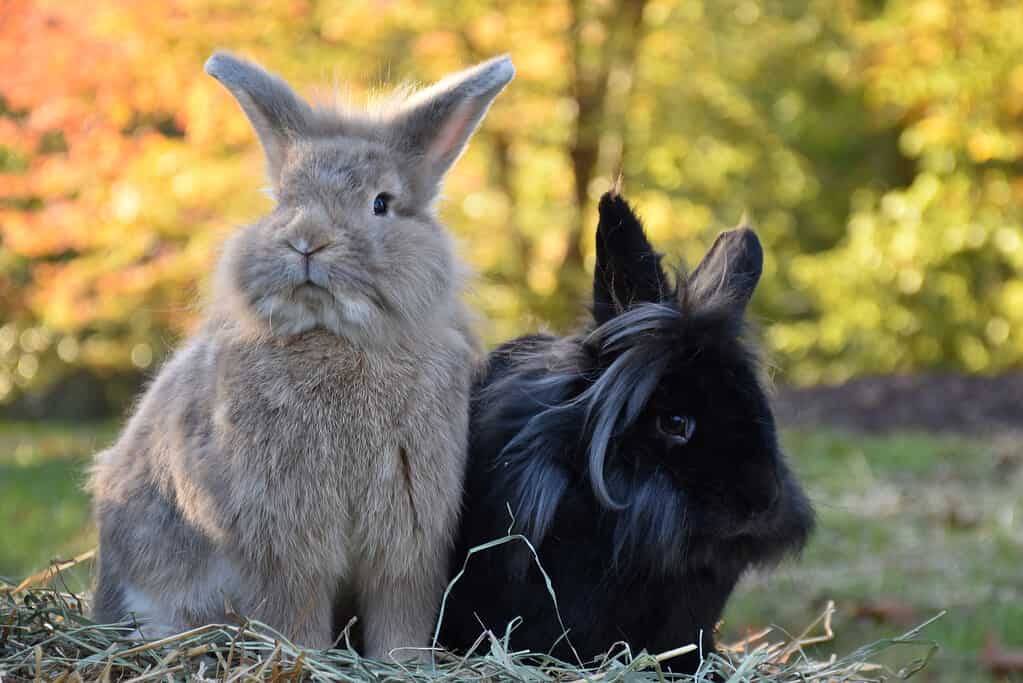
Lionheads should always be kept in pairs or groups with other rabbits.
©JudyN/iStock via Getty Images
Grooming Your Lionhead Rabbit
Due to their long fur, Lionhead rabbits can be high maintenance in the grooming department. Here are some pointers for keeping their fur healthy:
- Brush your Lionhead at least once a week. Those with double manes may need to be brushed more frequently.
- Never pull the fur. You want to brush slowly and gently. If your Lionhead has matted fur, trim it away carefully with a pair of scissors.
- Haircuts can keep your bunny clean. Lionheads can especially get dirty around their rear, but cutting the fur around their bums short can prevent this.
- Never bathe a Lionhead rabbit. Rabbits are self-grooming animals. Baths are not only emotionally stressful but can cause physical problems that may kill your rabbit! Similarly, your bun should never be left outside in the rain or taken for a swim.
Can You Keep Just One Lionhead Rabbit?
Rabbits are incredibly social animals, and they should always have one or more rabbit friends. Unfortunately, human companionship will never be enough, no matter how much time you spend with your Lionhead.
Everyone has to leave home sometimes, and this will leave your bunny completely alone. In addition, rabbits just can’t interact with humans the way they do with one another.
It’s like expecting you to interact with rabbits, never other humans, for the rest of your life. That would feel pretty isolating!
Of course, you also can’t just put two Lionheads together at random, as they might not get along. Rabbits can be difficult to bond, so I highly recommend getting help from a local rescue or researching the process thoroughly. Adopting a bonded pair initially can save you time as well.
Are Lionhead Rabbits Cage Animals?
A common myth is that rabbits can be comfortably kept in cages or hutches. Both are inappropriate for your Lionhead.
Ideally, your rabbits will be allowed to free-roam your rabbit-proofed home, just like you’d expect from a dog or cat.
Another option is to allow your Lionhead to free roam in one room of the house. It can be easier to bunny-proof on a small scale, and complete free-roaming can be impossible if you have predator animals in the house like dogs or cats. (These pets should never be allowed to interact with your Lionhead!)
They can have an area that’s just for them, but it should be large enough for them to run, jump, and stand upright.
For example, many people keep their buns in dog exercise pens when they can’t supervise them. This is especially useful when you first adopt your Lionhead and don’t yet trust them to free roam without you around. Once they outgrow being locked in the pen, you can keep it open as a safe space for them, similar to a dog’s crate.
Bunny-Proofing Your Home
Bunny-proofing the space your rabbit resides in is essential to their well-being. It can also prevent them from being destructive. If there’s one thing a rabbit loves, it’s to chew!
Here are some tips for rabbit-proofing your Lionhead’s space:
- Move cords out of reach, or use cord protectors. Many rabbits will chew cords if they’re within reach. If you have a room, such as an office, with many cords, you can also close this space off to your rabbit.
- Use baby gates for areas that are off-limits. This includes stairs, unsafe rooms, and anywhere else you don’t want your rabbit to go.
- Block baseboards with storage cubes or furniture. Not all rabbits chew baseboards, but it’s better to block them off preemptively than have to replace them later.
- Make sure your bunny can’t settle beneath your furniture. Lionheads naturally enjoy dark, covered spaces. These areas can be difficult to clean, and it’s hard to get the rabbit out in case of an emergency. Use storage cubes or other solutions to ensure your rabbit can’t get underneath beds, couches, and other furniture that’s low to the ground.
- Cover carpet corners. If your rabbit digs at the corners of the carpet, cover them with objects to stop the behavior.
- Lay rugs on hardwood floors. Many Lionheads dislike hard flooring since their feet can’t grip it well, and they end up slipping around. Area rugs or fleece fabric can help.
- Pick up treasured or dangerous items. Keeping your home tidy is key to keeping your Lionhead safe, and saving you from replacing your favorite things! Pay special attention to toxic materials like cleaners and plants, and things rabbits naturally love to chew like paper and wood.
Setting Up Your Lionhead Rabbit’s Space
Now that your rabbit’s home is safe, make sure they can still exhibit their natural behaviors! This second part of bunny-proofing includes:
- A safe, non-destructive digging space. A dig box is excellent for this! Bunnies often love to rifle through their hay piles as well.
- Chew toys. Chewing is good for your rabbits’ teeth, so make sure they have plenty of safe things to gnaw on.
- Hidey homes. Each rabbit should have their own hide, and ideally, you should provide extras as well. The larger your buns’ space, the more hiding places they’ll need to feel safe exploring the area.
Potty Training Your Lionhead Rabbit
Rabbits naturally go potty in corners, which can make potty training quite easy! Like cats, they can be trained to use litter boxes.
Look for a litter box that’s easy to climb in and out of, is large enough for your largest rabbit to stand fully inside, and that doesn’t have a lid. Lids can hold in odor and dust, which is bad for your rabbits’ lungs.
Keep at least one litter box per rabbit and clean them regularly. Never use clay or clumping cat litter, but instead opt for paper litter or rabbit-safe wood pellets.
Potty training is simple: keep your rabbit in a small area, such as a dog exercise pen. You can line the floor with a waterproof liner, such as a shower curtain covered by a layer of wicked fleece. Set up your litter box and place a large pile of hay inside, since rabbits potty the most as they’re eating.
Place any stray poops into the litter box to show your rabbit where you want them to go. If they pee outside of the box, clean the area thoroughly. You can place pee-soiled paper towels into the litter box as well–just make sure your rabbits don’t eat them!
Sometimes, rabbits will choose a different corner than where you put the litterbox. In this case, it’s best to move the litter box to the corner they chose.
How Much Exercise do Lionhead Rabbits Need?
As we discussed above, Lionhead rabbits should never be kept in a cage where they can’t stretch their legs. Whenever possible, they should be free-roaming in at least one room.
Bunnies are active day and night and don’t tend to sleep for long stretches like humans do. Keeping them in a small cage or hutch only at bedtime still neglects to give them the space they need, especially considering that they are most active at dawn and dusk.
In addition to providing space, you want to give your Lionhead activities to do. Provide a variety of chew toys to toss and chew, tunnels to run through, and hides for when they’re feeling overwhelmed or want to sleep.
Providing your bunny with a companion typically encourages them to be more active as well.
Lionheads don’t need dedicated, hands-on play with humans like some other pets. Providing them with these basics ensures that they’ll get the exercise they need on their own terms.
Health Considerations: Recognizing Common Health Issues and Ensuring Regular Veterinary Care for Lionhead Rabbits
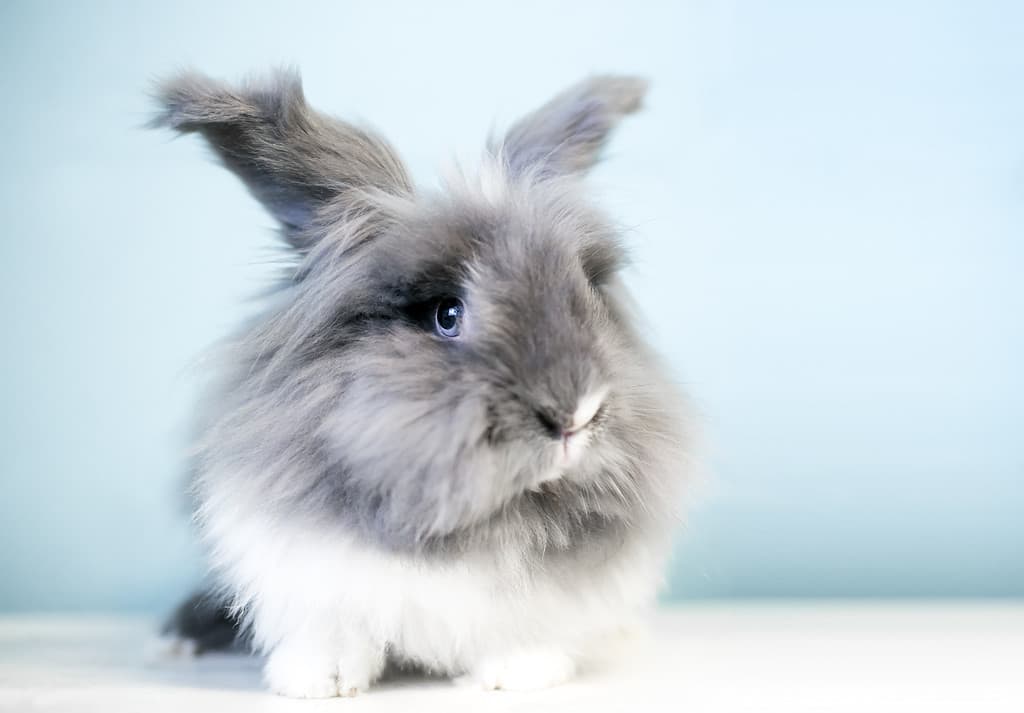
Lionhead rabbits live an average of 7-12 years.
©Mary Swift/iStock via Getty Images
Common Lionhead Rabbit Health Issues
- Upper respiratory infections (URIs): Upper respiratory infections are common in rabbits and can be deadly, especially without treatment. Keep your rabbits’ environment clean and dust-free, use only rabbit-safe litters, and seek veterinary treatment if you notice any signs of illness.
- Dental problems: Lionheads are especially prone to dental problems due to their small heads and tendency to have a lower jaw that’s longer than their upper jaw. You may notice overgrown teeth, difficulty eating, abscesses in the mouth, or dental infections.
- Spinal injuries: Careful handling is necessary to prevent spinal injuries in rabbits. Always supervise young children and teach them to interact gently, as they can easily injure your Lionhead by mistake. Avoid stairs and letting your Lionhead jump or fall from high surfaces.
- Gastrointestinal (GI) stasis: GI stasis happens when a rabbit isn’t eating enough to keep their digestive system moving. If your rabbit goes even ten hours without eating, they should be rushed to the emergency vet. GI stasis can kill a rabbit within just 24 hours.
- Hairball obstructions: Lionheads have long, thick coats that can cause blockages in their intestines when consumed during everyday grooming. Regular brushing is essential to prevent this from happening, especially while your rabbit’s fur is molting.
- Parasites: Outdoor and even indoor Lionheads can catch a variety of parasites including mites, E. Coniculi, and flystrike.
How Long do Lionhead Rabbits Live?
Lionhead rabbits live anywhere from seven to 12 years on average. That’s a pretty long time compared to other pet rodents!
The best way to ensure your Lionhead lives a long, happy life is to give them the right care. This includes a balanced diet, proper housing, companionship, and veterinary care.
How Often Should my Lionhead Rabbit See a Veterinarian?
When you adopt any new animal, you should bring them to the veterinarian for a check-up immediately. This ensures they’re healthy and is especially important if you already have pets at home who could get sick if your Lionhead has something contagious.
After this initial check-up, young, healthy Lionheads only need to see the vet once a year. Senior buns should have check-ups every six months.
If your Lionhead shows any symptoms or changes in behavior, please bring them in for a sick visit between their regular check-ups. Illness in rabbits can progress very quickly, so getting them to the vet promptly can be life-saving.
Pet Insurance for Lionhead Rabbits
Rabbits should see veterinarians who specialize in exotics, which requires extra schooling. These vets are often more expensive than dog or cat veterinarians.
If your Lionhead gets sick or injured, vet bills can be very expensive–think thousands of dollars. This is where pet insurance can be life-saving. It ensures that you don’t have to think so much about money when your furbaby is suffering.
Currently, Nationwide is the only insurance company that insures pet rabbits in the United States. Their plans range in coverage and deductible amounts. Plans with higher coverage and lower deductibles cost more monthly but can save you more in case of an emergency.
Thank you for reading! If you have feedback on this post, please contact the AZ Animals editorial team.
The photo featured at the top of this post is © JudyN/iStock via Getty Images
Thank you for reading! Have some feedback for us? Contact the AZ Animals editorial team.




